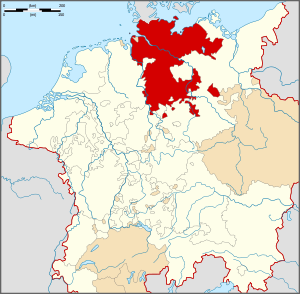Imperial County of Rantzau
| Imperial County of Rantzau | ||||||||||
| Reichsgrafschaft Rantzau | ||||||||||
| State of the Holy Roman Empire (until 1806) | ||||||||||
| ||||||||||
| Capital | Rantzau | |||||||||
| Government | Principality | |||||||||
| History | ||||||||||
| • | Established | 1650 | ||||||||
| • | Acquired by Denmark | 9 April 1726 | ||||||||
| • | Mediatised to Prussia | 1864 | ||||||||
| ||||||||||
The Imperial County of Rantzau (German: Reichsgrafschaft Rantzau) was an immediate state of the Holy Roman Empire. Its territory is more or less congruent with the present Amt Rantzau.
In 1649, Frederick III, Duke of Holstein-Gottorp, sold his part of the Lordship of Pinneberg, which had formerly belonged to the County of Schauenburg, to Christian Rantzau, royal Danish governor of Holstein. In 1650 or 1651, Rantzau became an immediate county and state of the Holy Roman Empire. In 1726, it was annexed by the Danish rulers, after Wilhelm Adolf, Count of Rantzau, had murdered his brothers and was imprisoned. Wilhelm Adolf died in 1734 and Rantzau was inherited by the Dukedom of Holstein, which was reigned by the Danish kings and its secundogeniturs.
Origin in the House of Holstein
| Holstein | |||||||||||||||||||||||||||||||||
| Holstein-Kiel (1261–1390) | Holstein-Itzehoe (1261–1300) | ||||||||||||||||||||||||||||||||
| Holstein-Segeberg (1273-1308) | |||||||||||||||||||||||||||||||||
| Holstein-Plön (1300–1390) | Holstein-Rendsburg (1300–1459) | Holstein-Pinneberg (1300–1640) | |||||||||||||||||||||||||||||||
| Duchy of Holstein (from 1474) | |||||||||||||||||||||||||||||||||
| Imperial County of Rantzau (1650–1726) | |||||||||||||||||||||||||||||||||
References
- Köbler, G. (2007). Historisches Lexikon der deutschen Länder (7th ed.). p. 549. ISBN 978-3-406-54986-1.
